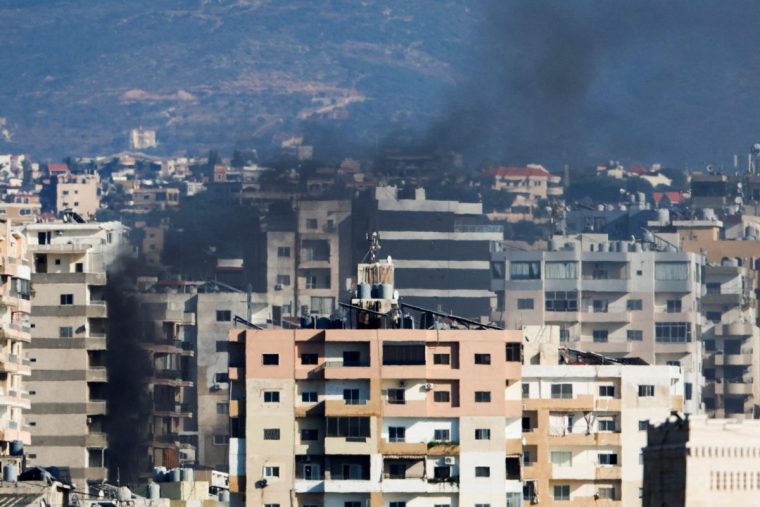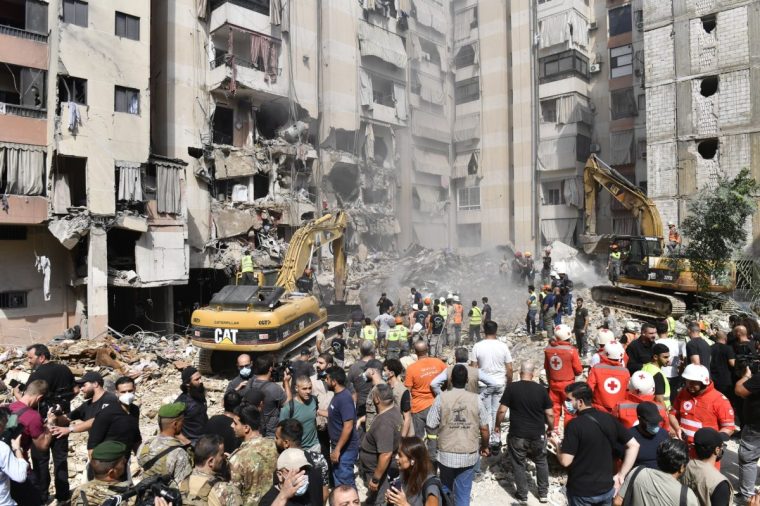Benjamin Netanyahu says Israel is dealing strikes “on Hezbollah that it never imagined” as tensions continue to escalate in the region.
In a statement, he added that the Israeli government “we will not rest until the residents of the north return home” after they were evacuated due to Hezbollah rocket strikes.
Head of the Israeli Defence Forces, Herzi Halevi, also said Hezbollah would be hit by a “very strong response” later on Wednesday.
“Hezbollah today expanded its [range] of fire. Later today, it will receive a very strong response … We are not stopping. We will keep attacking and harming them everywhere,” Mr Halevi told a tank unit along the border with Lebanon.
“Your entry there with force … will show [Hezbollah] what it is like to meet a professional combat force. You are coming in much stronger than them, much more experienced than them. Go in, destroy the enemy there, and go destroy the infrastructure.
Tehe IDF chief had warned that the military is preparing for a possible ground operation in Lebanon.
“You hear the jets overhead. We have been striking all day,” IDF chief of staff lieutenant general Herzi Halevi told troops on the border with Lebanon, according to a statement from the military. “This is both to prepare the ground for your possible entry and to continue degrading Hezbollah.”
A new diplomatic effort to end hostilities in both Gaza and Lebanon is being spearheaded by the US, sources told Reuters.
According to Nikos Christodoulides, the president of Cyprus, France is pushing for an interim settlement to halt hostilities between Israel and Hezbollah.
Earlier, Hezbollah fired a missile towards Tel Aviv for the first time and Israel responded by launching “extensive strikes” on a reported 280 Hezbollah positions throughout Lebanon.
The Israeli army said on Wednesday it was calling up “two reserve brigades for operational missions in the northern arena”.
“This will enable the continuation of combat against the Hezbollah terrorist organisation,” it said.

Fifty-one people have been killed in the Israeli strikes on Lebanon, the country’s health ministry has said.
Four people were killed and seven others were injured in the town of Joun, in central Lebanon; three people were killed and thirteen injured in the town of Ain Qana, southern Lebanon; and three others were killed and another nine injured in Al-Maaysra in Keserwan, the ministry added.
Seven people are also reported to have been killed in Baalbek Hermel in the Bekaa Valley and another four in Bint Jbeil, southern Lebanon.
In Tebnine, two people have reportedly been killed.
Earlier on Wednesday, Israel’s air defence system intercepted a missile launched from Lebanon towards Tel Aviv in a rare attack by Hezbollah on the nation’s economic capital, its military said.
The single surface-to-surface missile was intercepted after it was detected crossing from Lebanon, marking Hezbollah’s first attack on central Israel in the near year-long conflict between the two.
It marks the “first time ever” a Hezbollah missile has reached the Tel Aviv area, an Israeli army spokesman told the AFP news agency.
Hezbollah said it launched a rocket targeting Mossad headquarters near Tel Aviv, which it claims was responsible for assassinating leaders and blowing up pagers and walkie-talkies.
There were no reports of damage or casualties. While warning sirens sounded in Tel Aviv and the city of Netanya, the military said there was no change to civil defence instructions for central Israel.

The Saudi state-owned Al Arabiya network reported that the missile was aimed at the Glilot military intelligence compound in central Israel.
Some smaller projectiles were fired into Israeli territory from Tebnine in southern Lebanon, the Israel Defence Forces said.
The Israeli military also said its fighter jets intercepted an unmanned aerial vehicle (UAV) that crossed from Syria on Wednesday.
“The UAV was intercepted … south of the Sea of Galilee. No damage or injuries were reported,” it said.
The Israeli military added it is conducting extensive strikes in Lebanon’s south and Bekaa Valley area.
Hezbollah has fired hundreds of missiles and rockets at Israel in recent days amid a sharp escalation in a cross-border conflict that has lasted for nearly a year.
The latest death toll from Israeli attacks on Lebanon over three days rose to 615, with more than 2,000 injured, according to reports.
Casualty figures increased after the highest single-day death toll was reported on Monday in Lebanon since the civil war ended in 1990.
Israeli air strikes were reported in Lebanon’s southern towns and cities, including Jiyyeh, Tyre and Nabatiye.
Civilians continued to flee the area, resulting in gridlock on the main road leading north.
The United Nations has said more than 90,000 people have been displaced by five days of Israeli attacks on Lebanon.
An Israeli attack targeting Hezbollah commander Ibrahim Qubaisi in the southern suburbs of Beirut killed at least six people, including the commander, while 15 others were injured, Lebanese officials said.
The Iranian-backed group later confirmed the death of Qubaisi.
Iran’s supreme leader Ayatollah Ali Khamenei said killing valuable Hezbollah members will not bring it to its knees.
Israel reported more than 300 impacts, including inside Haifa, which has been largely spared during the conflict so far.
A senior UN source told i that the death toll would continue to rise as emergency workers carried out further search and rescue operations in areas targeted by strikes.
Dr Nasser Yassin, head of the National Committee for Disaster and Attack Response Co-ordination, said more than 200,000 people had fled targeted areas with hundreds of schools repurposed as emergency shelters.
Dr Yassin told i that Lebanon had begun implementing a “pre-established plan, expanding shelter centres, and distributing aid in collaboration with our partners.”
At least 569 people were killed and 1,835 injured in Israeli strikes since Monday. At least 50 of the dead were children and 94 were women, the Lebanese Health Minister, Firass Abiad, said on Tuesday.
PM Sir Keir Startmer has warned UK nationals in Lebanon “now is the time to leave” as British troops were deployed to Cyprus amid fears of further military escalation in the region.
Around 700 UK troops are being moved to Cyprus to help assist the evacuation of up to 10,000 Britons who could require evacuation from Lebanon if commercial air routes and roads are closed off due to the conflict.


Maurice Saatchi: I used to adore capitalism – then I had lunch with Margaret Thatcher